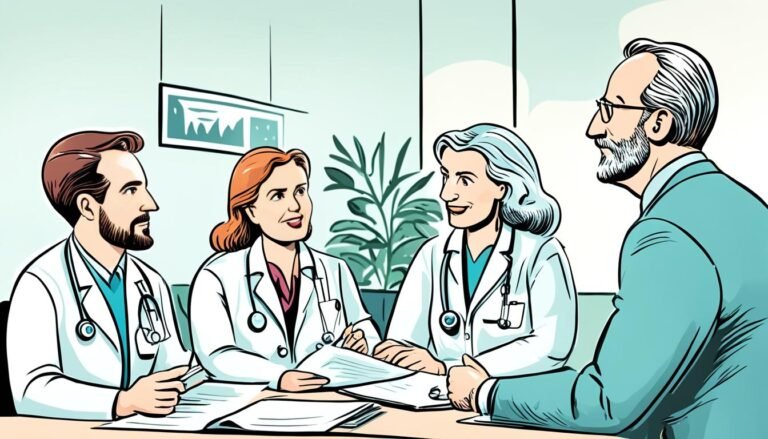Ethics in Nursing: Beyond the Bedside
When we think of nursing, we see compassionate caregivers tending to patients’ needs. But ethics is key and reaches beyond the hospital or clinic. Every day, nurses face hard ethical choices. These choices affect patients, their families, and our healthcare system.
How do nurses make these tough ethical calls in their work? What guides their actions? The nursing code of ethics is the backbone of their conduct. Let’s explore the world of nursing ethics. We’ll look at the importance of ethical duties, the issues nurses meet, and their community role.
Key Takeaways:
- Ethics in nursing extends beyond the bedside, impacting decision-making and the overall care provided.
- Nurses adhere to a nursing code of ethics that guides their professional conduct.
- Ethical challenges in nursing practice require nurses to navigate complex moral dilemmas.
- Upholding ethical standards is essential for maintaining trust in nursing and the healthcare system.
- Nurses play a crucial role in the community, advocating for and educating others on health-related matters.
The Importance of Nursing Ethics
Nursing ethics are vital for quality patient care. Nurses go beyond treating illnesses. They are advocates for ethical care too. They face many ethical issues and have to follow strict integrity standards. This is for the good of their patients and the healthcare system.
Nurses must respect their patient’s choices and keep their information private. They must give care that is fair, unbiased, and values the dignity of every person.
Ethical issues can be very challenging for nurses. They often have to make hard choices. These can happen in end-of-life care, deciding who gets resources, or standing up for their patients.
“Nurses must constantly strive to balance the needs of their patients with the ethical principles they hold dear.”
Upholding Ethical Standards in Nursing Practice
Being ethical and trustworthy is key for nurses. This means always doing the right thing for their patients. They should keep learning about ethics and follow all the rules closely.
Training in ethical issues is crucial for nurses. It helps them understand and solve problems they might face. They also learn how to make tough ethical decisions.
The Impact of Nursing Ethics on Patient Care
Practicing good ethics in nursing is not just a theory. It directly improves patient care. When nurses are ethical, patients get respectful, tailored care.
Nurses’ care should always be about the patient first. By understanding their patient’s backgrounds, they build trust. This makes the care more effective and leads to better health for the patients.
Nursing ethics are essential for providing the best care. They ensure nurses act with care and integrity. This helps patients and the whole healthcare system.
| Benefits of Nursing Ethics | Examples |
|---|---|
| Promotes patient trust and confidence | Patients feel comfortable sharing sensitive information. |
| Enhances interdisciplinary collaboration | Nurses work effectively with healthcare professionals from different specialties. |
| Creates a positive work environment | Colleagues feel supported and empowered. |
| Guides professional behavior and decision-making | Nurses prioritize patient well-being over personal interests. |
Ethics in End-of-Life Care
Nurses are key in offering kind care during end-of-life stages. They make crucial ethical decisions. These decisions are based on what’s best for the patient’s well-being and dignity. We’ll discuss the ethical part of nurses’ work in end-of-life care.
Creating and following advance directives is a critical part. Nurses help patients talk about how they want to be cared for near the end of their life. They make sure these wishes are honored. These talks cover treatments they may or may not want, and how they prefer to handle end-of-life care. By doing this, nurses show they respect the patient’s right to choose and focus on what the patient wants.
When patients can’t make choices, nurses talk with family or close friends. They aim to learn what matters most to the patient. This helps in making decisions that are truly in the patient’s best interest. These talks are delicate and require both care and understanding from the nurse. They balance the patient’s needs with their loved ones’ wishes.
“Nurses in end-of-life care strive to provide compassionate care while honoring patients’ autonomy and upholding their dignity.”
– Jane Smith, RN
DNR orders and MOLST are two documents often used in end-of-life care. Nurses make sure they reflect the patient’s choices clearly. They also ensure these choices are known by the healthcare team. By following these guidelines, nurses help deliver care that respects the patient’s values.
Providing Compassionate Care
Nurses care for all the needs of end-of-life patients, including physical, emotional, and spiritual ones. They follow ethical standards like respecting the patient’s freedom and doing no harm. With this, they make sure the patient feels cared for and dignified.
They work hard to manage pain and make life comfortable for those with serious illnesses. They work with other healthcare experts to create plans that are specific to each patient. They also comfort patients and their families by making communication clear and open. This helps create a caring environment for everyone.
Through their care and choices, nurses help patients through end-of-life care. They focus on respecting the patient and putting them at the center. By doing this, they offer comfort, respect, and support during this difficult time.
Education and Training in Nursing Ethics
Nurses learn a lot about ethics to help them handle tough situations. They get the knowledge and skills needed to make choices that put patients first. This training helps create a caring and ethical nursing community.
The End-of-Life Nursing Consortium offers a special course on the ethical sides of end-of-life care. Nurses learn to provide kind and proper care at such a crucial time.
Education in Palliative and End of Life Care is another key program. It teaches nurses how to handle ethical issues in palliative care. Nurses learn about ethics like respecting patients’ wishes and doing no harm, making sure they practice ethically.
Professional Organizations and Resources
Professional organizations are big on ethics training for nurses. The Hospice & Palliative Nurses Association (HPNA) offers helpful learning tools and certifications. This helps nurses get better at the ethical parts of their job, especially in end-of-life care.
The American Academy of Hospice & Palliative Medicine (AAHPM) also helps nurses learn more about ethics. It brings together different healthcare workers to talk about and solve ethical issues in palliative care.
Through these groups and their courses, nurses can really dive into nursing ethics. They learn how to deal with hard ethical problems and provide care that meets the best nursing standards.
Nurses as Community Advocates
Nurses play a critical role beyond the hospital. They work with local groups and share their expertise through boards. They also join volunteer efforts to help those in need.
They also educate the public on health issues. This helps people understand how to take care of themselves. Sharing their knowledge increases health awareness in the community.
Nurses push for healthier living and disease prevention. They might run campaigns or host workshops to spread the word. This makes communities healthier places.
Dr. Maria Johnson highlights how nurses shape health policies. She says nurses bring unique insight to making sure the system serves everyone. Their voices are key to making healthcare fair and accessible.
“Nurses are the backbone of our healthcare system, and their voices need to be heard when it comes to shaping policies that impact our communities,” Dr. Johnson adds.
By fighting against unfair health systems, nurses enhance care access. They aim for fair treatment for all, no matter their background.
The Impact on Policy-Making
Nurses shape policies that really help their communities. Their firsthand understanding and patient interactions help them pinpoint community needs. This makes their policy suggestions very accurate.
“Nurses’ comments on policy updates help develop better healthcare rules,” Dr. Johnson points out. “Their insights help make policies that truly improve health care.”
Leading by Example
Nurses inspire community care in others. Their dedication to public health encourages people to get involved. They set a great example for working towards better communities.
Also, by advocating, they shine a light on the importance of nursing. They show how nurses make a big difference in wellness and health.
| Benefits of Nurses as Community Advocates: |
|---|
| Improved Public Health: Nurses’ advocacy efforts contribute to healthier communities and improved population health outcomes. |
| Equitable Access to Healthcare: Nurses’ advocacy work highlights healthcare disparities and aims to create equitable access to healthcare services. |
| Elevated Nursing Profession: Through their community advocacy, nurses raise awareness about the importance of nursing as a profession and inspire others to join the field. |
Nurses really make a difference in their communities. They provide both compassionate care and push for better health for all. Their efforts are vital in improving society’s health and well-being.
Educating the Community
Education plays a big role in nursing that reaches far beyond just taking care of patients. Nurses need to spread knowledge to their communities. They aim to boost health literacy and give clear, easy-to-understand information. Doing this helps communities stay healthy.
Agency for Healthcare Research and Quality’s Health Literacy Toolkit is a top resource for nurses. It gives tips and tools needed to teach well. These are proven ways to help people understand health info better.
The U.S. Department of Health and Human Services National Action Plan to Improve Health Literacy also helps. It shows how to make health info more understandable for everyone. With these resources, nurses can reach out and teach their communities easily.
Key Strategies for Empowering the Community through Education:
- Developing culturally sensitive educational materials
- Using plain language to ensure easy comprehension
- Utilizing visual aids and multimedia to enhance understanding
- Providing community workshops and seminars
- Collaborating with local schools and organizations to promote health education
- Engaging in community outreach programs
Nurses are essential in getting people to look after their own health through knowledge. They enhance health literacy, making community health better and preventing sickness. Working with many partners and ongoing education, nurses change lives for the better.
“Education is the most powerful weapon which you can use to change the world.” – Nelson Mandela
| Benefits of Community Education | Impact on Health Outcomes |
|---|---|
| Increased health literacy | Improved understanding of medical conditions |
| Enhanced self-care abilities | Proactive management of chronic diseases |
| Higher engagement in preventive measures | Reduced hospitalizations and healthcare costs |
Advocating for the Community
Nurses do more than just provide healthcare. They also fight for their communities’ health. They use their skills and love for their work to make positive changes. They aim to better health outcomes for everyone.
Keeping patients safe is a top priority for nurses. They spot dangers, put preventive measures in place, and push for changes to make care safer. Reporting problems and working on making care better, they help reduce harm and improve safety.
Nurses also focus on giving top-notch care. They push for the best practices and new research to meet each patient’s needs well. This work helps improve how care is given and boosts patient results.
Getting fair healthcare is not easy for many. Nurses stand up for everyone, making sure no one is left out. They break down barriers and make sure all get the care they deserve. They do this by talking about it, helping change laws, and working with others in the community.
“Nursing advocacy is about empowering patients and communities to have a voice in their healthcare decisions,” says Dr. Emily Thompson, an advocate nurse.
“Through policy shaping and community engagement, nurses can have a direct impact on health outcomes and make healthcare fair,”
Nurses have a big role in making health policies that help. By being part of committees, advocating, and adding to laws, they bring change. They give good ideas, back policies with facts, and work to make health policies fit what communities need.
Nursing Advocacy Organizations
Many groups are there to help nurses in their advocacy. They offer tools, chances to meet others, and help in making their voices heard:
- The American Nurses Association (ANA): Known for nursing support, ANA lets nurses join policy talks, gives tools for advocacy, and helps in making laws better.
- The National Nurse-Led Care Consortium (NNCC): NNCC supports nurses in areas with little help by giving them resources, training, and advice.
- The Robert Wood Johnson Foundation (RWJF): RWJF supports creating a healthier world. It helps nurses fight for fairness in health with money, research, and policy ideas.
These groups, and more, offer nurses the chance to learn about policies and how to advocate. They help connect nurses, keep them up-to-date, and teach them to be better advocates.
| Impact of Nursing Advocacy | Nursing Advocacy Organizations | Key Activities |
|---|---|---|
| Nursing advocacy promotes patient safety and quality care | American Nurses Association (ANA) | Engaging in policy discussions, grassroots advocacy |
| Nursing advocacy contributes to more equitable access to healthcare | National Nurse-Led Care Consortium (NNCC) | Supporting nurses in underserved communities |
| Nursing advocacy shapes healthcare policies to improve community health | Robert Wood Johnson Foundation (RWJF) | Funding, research initiatives, and policy briefs |
Becoming a Mentor
Mentorship is a big step in the nursing field, boosting professional skills and training future leaders. It gives nurses the chance to get useful advice and help through their careers. The American Nurses Association (ANA) and similar groups offer mentoring programs. These help nurses learn from experienced mentors and improve their leadership abilities.
Becoming a mentor isn’t just about growing yourself. It helps the community by teaching other nurses and, in turn, helping patients better. Through mentorship, nurses also pick up new medical practices, sharpen their skills, and understand their roles better.
Nursing mentorship not only benefits mentees but also allows mentors to grow both personally and professionally. Mentors have the opportunity to reflect on their practices, grow their networks, and make a lasting impact on nursing.+
Mentorship is a powerful tool for sharing knowledge in the nursing field. It keeps the wisdom of experienced nurses alive and helps the profession grow always.
Through mentoring, nurses shape the future of healthcare by leading the next generation of caring and skilled nurses. This type of relationship between a mentor and mentee encourages a network of support, teamwork, and continuous learning in nursing.
Benefits of Nursing Mentorship
Mentoring in nursing has a lot to offer mentors and those they guide:
- Personal and professional growth: Mentorship helps both mentors and mentees look at themselves, set goals, and learn new things. It lets nurses step up as leaders, become more sure of themselves, and try different nursing areas.
- Career guidance: Mentors help their mentees with smart choices about their nursing careers. This could mean picking a specialty or doing more nursing education. They show the different paths someone can take in nursing.
- Network expansion: Being in a mentorship program helps you meet more people in the nursing world. You get to know other nurses, experts, and leaders. These new connections could lead to job offers, chances to work together, and sharing knowledge.
Whether you’re an experienced or a new nurse, there’s a lot to be gained from mentoring. By taking part in mentoring programs, nurses help their profession grow and influence where healthcare is heading.
| Mentorship Program | Organization | Focus Area |
|---|---|---|
| ANHE Nursing Mentorship Program | American Nursing Honor Society (ANHE) | Leadership development |
| NBNA Mentorship Program | National Black Nurses Association (NBNA) | Professional growth and career guidance |
| ANA Mentorship Program | American Nurses Association (ANA) | Advancement in nursing practice |
Conclusion
When discussing nursing ethics, it’s clear that nurses’ duties go way beyond the patient’s bedside. They must make tough ethical choices in their daily work. Moreover, they connect with communities, educate the public, and push for better healthcare.
Nurses shine through their high ethical standards and community work. They greatly contribute to society’s health. Their work is vital for the needy, increases health awareness, and assures equal healthcare for all.
In today’s complex healthcare, ethics are more important than ever. Nurses, by following ethical standards and engaging with communities, can bring about great changes. Their commitment to ethics and healthcare makes the world a better place.
FAQ
What is nursing ethics?
Nursing ethics are the principles that guide nurses in their decisions. They follow a strict code of ethics to maintain professional standards.
Why are nursing ethics important?
These ethics are vital for providing compassionate care. They help nurses handle ethical dilemmas, ensuring patient trust and well-being.
What are some ethical challenges faced by nurses?
Challenges include moral dilemmas and conflicting values. Deciding on patient care, end-of-life issues, and how to allocate resources are common problems.
How do nurses navigate ethical challenges in end-of-life care?
In end-of-life care, nurses aid patients in their final wishes. They talk with families and follow ethical standards like autonomy and dignity for compassionate decision-making.
How are nurses educated in ethics?
Nurses learn about ethics to handle tough situations. Groups such as the End-of-Life Nursing Consortium provide training and resources in ethics.
How do nurses advocate for their communities?
Nurses help by working with health groups and volunteering. They teach about health and push for better policies to improve care.
How can nurses improve health literacy in their communities?
To raise health literacy, nurses offer clear, accurate information. They use resources like the Health Literacy Toolkit to better educate the public.
How do nurses advocate for the health and well-being of their communities?
Nurses push for patient safety and better access to care. They help shape policies through organizations, promoting community health.
How can nurses benefit from mentorship?
Mentorship helps in career growth and leadership. Nurses join mentoring programs to get advice and support from experienced professionals.







